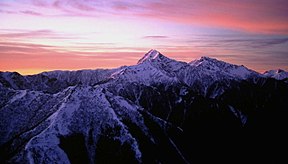| Akaishi Mountains | |
|---|---|
| Southern Alps (南アルプス) | |
 | |
| Highest point | |
| Peak | Mount Kita |
| Elevation | 3,193 m (10,476 ft) |
| Coordinates | 35°40′27″N 138°14′12″E / 35.67417°N 138.23667°E |
| Dimensions | |
| Length | 120 km (75 mi) |
| Width | 40 km (25 mi) |
| Naming | |
| Native name | 赤石山脈 (Japanese) |
| Geography | |
| Country | Japan |
| Prefectures | |
| Range coordinates | 35°34′N 138°11′E / 35.567°N 138.183°E |
| Parent range | Japanese Alps |
The Akaishi Mountains (赤石山脈, Akaishi Sanmyaku) are a mountain range in central Honshū, Japan, bordering Nagano, Yamanashi and Shizuoka prefectures. They are also called the Southern Alps (南アルプス, Minami Arupusu), as they join with the Hida Mountains ("Northern Alps") and the Kiso Mountains ("Central Alps") to form the Japanese Alps.
Origin of the name
[edit]There are a lot of red stones (赤石 Aka-Ishi) around the Akaishi River, a tributary of the Ōi River in the southern part of Southern Alps. Then it was said that the mountain of red stone came to be called Mount Akaishi. The mountain represents the mountain range and the name Akaishi is used for the whole range mountain range, Akaishi Mountains.[1]
Major peaks
[edit]Almost all major peaks of the Akaishi Mountains are in Minami Alps National Park that was established on June 1, 1964.[2] The range is the source of two rivers, Ōi River and Tenryū River, which flow to the Pacific Ocean.


| Image | Mountain | Height | Note |
|---|---|---|---|
| Mt. Hō'ō | 2,840 m (9,318 ft) | 100 Famous | |

|
Mt. Nokogiri | 2,685 m (8,809 ft) | 200 Famous |
| Mt. Kaikoma | 2,967 m (9,734 ft) | 100 Famous | |
| Mt. Senjō | 3,033 m (9,951 ft) | 100 Famous | |
| Mt. Kita | 3,193 m (10,476 ft) | the highest mountain in Akaishi Mountains 100 Famous | |
| Mt. Aino | 3,190 m (10,466 ft)[3] | 100 Famous | |
| Mt. Nōtori | 3,026 m (9,928 ft) | 200 Famous | |
| Mt. Shiomi | 3,047 m (9,997 ft) | 100 Famous | |
| Mt. Warusawa | 3,141 m (10,305 ft) | 100 Famous | |
| Mt. Akaishi | 3,120 m (10,236 ft) | 100 Famous | |
| Mt. Hijiri | 3,013 m (9,885 ft) | 100 Famous | |

|
Mt. Tekari | 2,591 m (8,501 ft) | 100 Famous |
Panorama
[edit]Flora and fauna
[edit]Alpine plants, such as Siberian dwarf pine can be seen above the tree line. Rock ptarmigan and spotted nutcracker also live in the alpine zone. Japanese serow and sika deer live in the forest belt on the mountain slopes. Callianthemum hondoense (北岳草, Kitadake-sō) is endemic to Mount Kita.
-
Callianthemum
hondoense
Walter Weston in the Japanese Alps
[edit]Englishman Walter Weston introduced the Western world to the Japanese Alps in his book Mountaineering and Exploring in the Japanese Alps. During his visits to Japan, he climbed Akaishi Mountains. Several monuments in his memory have been set up in several places in the Japanese Alps.
He climbed the following peaks:
- 1892 Mount Akaishi - The first non-Japanese to climb this mountain
- 1902 Mount Kita
- 1903 Mount Kaikoma
- 1904 Mount Hōō and Mount Senjō
See also
[edit]- Japanese Alps
- Hida Mountains (Northern Alps)
- Kiso Mountains (Central Alps)
- Minami Alps National Park
- Minami-Alps Biosphere Reserve
- 100 Famous Japanese Mountains
- Walter Weston
References
[edit]- ^ Name dictionary of Japanese Mountain (日本山名辞典), Shōbunsya(昭文社) in 1992, ISBN 4-385-15403-1, P4
- ^ Minami Alps National Park Archived 2011-03-22 at the Wayback Machine(home page of the Ministry of the Environment)
- ^ "標高値を改定する山岳一覧" (PDF). Geospatial Information Authority of Japan. Archived from the original (PDF) on 29 June 2021. Retrieved 11 February 2023.
Books
[edit]- Mountaineering and Exploring in the Japanese Alps -by Walter Weston (1896)







